#deity resources
Explore tagged Tumblr posts
Text
Beginner’s Guide to Hellenic Polytheism
I KNOW this is a really long post but my intention was to just note down everything that I think is important for beginners and that’s A LOT. It took me forever to learn some of these things but they’re so important, so buckle in. I hope this helps some people.
If I’ve missed anything, please feel free to let me know what you’d like me to add. I’ve been working on this for two days, so if there are typos, I’m so sorry.
The sections I cover here are key terms, mythic literalism, deity work vs deity worship, FAQs and General Advice.
Some Key Terms
Hellenic Polytheism: Hellenic means Greek, and Polytheism means worshipping multiple gods. So, Hellenic Polytheism is the worship of the Greek Pantheon which is also referred to as the Theoi. The people who practice could be referred to as Hellenic Polytheists. Some also call themselves Hellenic Pagans, but not all people who practice Hellenic Polytheism consider themselves pagan.
Hellenistic: you may see the term ‘Hellenistic Polytheism’, but this is my PSA to ask people not to use that, as it’s incorrect. Hellenistic refers to a specific period of Andient Greece, from 323-32 BC, and your worship is almost definitely not specifically focused on that period. Additionally, here is a post by a Greek person on why ‘Hellenism’ and ‘hellenismos’ are disrespectful.
Ouranic: this is the term for the heavenly gods. Be aware that there is some overlap between Ouranic and Chthonic deities. Whether a deity is Ouranic or Chthonic will effect things like prayer position (palms up for Ouranic) and whether offerings can be eaten or drank (yes for Ouranic)
Chthonic: this is the term for the underworld gods. Be aware that there is some overlap between Ouranic and Chthonic deities. Whether a deity is Ouranic or Chthonic will effect things like prayer position (palms down for Chthonic) and whether offerings can be eaten or drank (no for Chthonic) side note - when it comes to hero worship, I personally treat them as if they’re chthonic.
Kharis: this means reciprocity, and also refers to the relationship formed between us and the gods. Arguably the most important aspect of Hellenic Polytheism is that when you ask something of a deity, you must give an offering in return. Size of what you’re asking for should correspond to size of the offering, or if you’ve given many little offerings without asking for anything you can use that as why you should be given the Big Thing.
Xenia: guest-friendship, hospitality. The idea that any stranger could be a God in disguise, so treat everyone respectfully. It’s an Ancient Greek social custom that a lot of Hellenic Polytheists see as important today. Simply put, in modern times this most often just means being kind to strangers. There’s a lot more to it than that though, so look here. Know that Xenia is a two-way thing, so you have to be generous to your guests but they must also respect your home.
Eusebeia: basically, piety. Respecting the Gods. This is really the only ‘rule’ of Hellenic polytheism. There’ll be different ideas of what is considered respectful, but as long as you have good intentions and don’t do anything you KNOW would be offensive, you’re okay. Don’t insult the gods (any of them), don’t ask for anything without offering something else, and don’t treat yourself as equal to or higher than the theoi.
Hubris: excessive pride or dangerous overconfidence, often the fatal flaw of a lot of Greek heroes in mythology. Specifically, this is when you act better than or equal to the gods. You are not.
Libations: a type of offering, in the form of a liquid. Usually poured on the ground but can be drank (unless it’s to a chthonic deity) if you’re a closeted Hellenic polytheist who can’t just pour some liquid on the floor every time you want to offer it. My advice for food offerings/libations to chthonic deities if you’re not openly a hellenist is to offer leftovers, rotting food, or something you otherwise know will go to waste.
Altar: traditionally a place used to put physical offerings and food offerings for deities. Some people have an altar to each deity, some people have one altar for all their deities. These can be as big or as small as you want. People may use shelves, drawers, boxes, windowsills, etc, and I don’t even use mine for food offerings, only for physical ones because I usually eat the food offering (I don’t like the idea of wasting food). My altars also just serve as a dedicated space for that deity in my life.
Hero worship: this is the worship of ‘heroes’ in Greek mythology, which includes literally any mortal. For example, I worship Odysseus of Ithaca, Penelope of Ithaca, Helen of Sparta, and Tiresias of Thebes. I’ve been asked a lot about how hero worship differs from deity worship, and you can find that answer here.
Devotee: there is a lot of disagreement on what the difference between a devotee and worshipper is, but for me, I’m devoted to Athena as I feel I have the closest bond with Her of all my deities and I honour Her the most. This partly comes from my feeling that She has been with me for much longer than I’ve been aware of Her presence, and that also so much of who I am and what I value comes under Her domains.
Patron: this basically means that if part of your identity comes under the domain of a deity, then that deity is your patron. There can be occupational patrons (like Hermes is the patron of merchants) or to do with things like gender (Hera is a patron for women. Yes this includes trans women, transphobes are not welcome here.) You can have more than one patron, and you don’t need to worship all of the deities who would be considered your patron.
Epithets: these are titles given to deities. There are two types - cult epithets, which describe the aspect of a deity you’re focusing on (like Athena Ageleia, meaning ‘Protector of the People’) since they have a lot of domains and it’s important in prayers to specify what you want. Then there’s poetic epithets, which are adjectives, often used to compliment a deity. I like using these to make my prayers seem more sophisticated to be honest (example: white-armed Hera)
Unverified Personal Gnosis: gnosis is spiritual knowledge. If it’s unverified, that means that it has no basis in historical sources as far as the person is aware, and they don’t know anybody else who has the same experience. You will often see this abbreviated as UPG. Personally, I think UPG is really valid, considering a lot of things are unknown to us due to the loss of sources overtime.
Shared Personal Gnosis: gnosis is spiritual knowledge. Like UPG, Shared Personal Gnosis (often abbreviated as SPG) doesn’t have any historical backing as far as the people who believe it are aware, but it is shared by multiple different people and therefore seen by some as more valid than UPG (though I’d argue that all SPG is UPG before you know that other people agree)
Verified Personal Gnosis: gnosis is spiritual knowledge. It being verified means that there are historical sources to back up the belief, and this is commonly abbreviated to VPG. You are more likely to come across the terms UPG than SPG or VPG, and most of what Helpol people on tumblr discuss is UPG, even if they don’t state that directly.
Reconstructionist: these are people who try to ‘reconstruct’ the ancient religion, recreating ancient rituals as best they can and doing things as close as they can get to how the ancient Greeks did based on our historical sources. An important note here is that we will never be able to do this perfectly and that’s okay. For example, I would hope none of us are making animal sacrifices.
Revivalist: these are people who try to recreate the ‘spirit’ of the religion, though not with the exact practices that the Ancient Greeks used. Revivalists are more concerned with the values and beliefs of the ancient religion than they necessarily are with how it was practiced. I personally feel like I fall somewhere between the two, but I also think both are really valid!
Mythic Literalism
Mythic Literalism is the idea that the stories we see in any mythology actually occurred. In Hellenic Polytheism, this is not how we tend to look at the Greek myths. And it’s not how the ancients saw them either.
Greek mythology has always been interpreted as symbolic. For example, Hades kidnapping Persephone is mostly accepted to be about mothers in Ancient Greece being separated from their daughters once they marry. It does not mean that Hades, the God, kidnapped Persephone, the Goddess, and that people who worship Hades are evil because Hades is a kidnapper. This myth can also be interpreted through the lens that death separates families.
This is important because the Gods all do things that are, by today’s standards, incredibly immoral - and a lot of them were even immoral in antiquity. It is important to not take the myths literally to avoid feelings of guilt over worshipping something horrific.
And yes, this applies to Zeus. He is not a rapist, He’s a male fertility god. In myths he does bad things because he represents kings and kings can abuse their power. Things like that.
But it’s still good to research the myths! It’s good to learn the ways in which these deities were understood and what their domains can represent. Myths also help us to feel more familiar with our deities. Additionally the myths tell us not to be hubristic, and things like the Iliad tell us about Oaths and Offerings and Xenia. These are important parts of helpol.
Deity Work vs Deity Worship
I’m going to preface this section by saying that I worship deities, I don’t work with them, so even though I’m doing research on this please take everything I say about deity work with a grain of salt and note that the rest of this post might apply more to worship, because that’s what I’m familiar with. Lastly, my intention here is not to place a value judgement on either type, I just want to try and make a full explanation for anyone out there looking for one, since I’ve found it to be kind of difficult to find.
From my understanding, deity work is common among witches, and usually involves asking a deity to help with your spells or other forms of magick. When you work with a deity, you are asking them to mentor you in a sense, and there’s often a specific goal in mind that they’re hoping to achieve with help of the deity. Additionally, because of that goal-oriented relationship, deity work has deadlines(?). Like, once you’ve achieved the goal you had, the deity will stop working with you
There are similarities, as both seem to involve reciprocity and offerings, and both involve cultivating a relationship with deities, even if the nature of that relationship and the reason for offering is different.
Deity worship doesn’t have a set end-goal. You CAN stop actively worshipping a deity, but this doesn’t usually come after a specific goal is achieved because there isn’t a goal in mind. Worship is more about honouring the deity. Khakis is built out of admiration, respect and love for the deity. This is why we pray, make offerings, etc. it’s all to honour the gods. We do ask for things in deity worship, but that’s not the entire point like it is for deity work.
FAQs
Do I need to be called to worship/work with a deity?
Nope! You are 100% allowed to reach out first. You can do that by praying or making an offering. Remember to research the deity first, so you know what epithets to use, know what symbols they’re associated with, have ideas for offerings, etc. Also, if a deity calls to you, you are not obligated to worship them. Acknowledge them and move on if you don’t have time, energy, or interest in worshipping them at that time.
Where can I find information on deities?
The main site that I think everyone uses is theoi.com, which has really in-depth pages on a lot of deities, with their myths, lists of epithets, family trees, etc. it’s a really useful resource!
Do I need an altar?
No. They’re nice to have but you don’t need one straight away. It took me two years of worshipping to get any altars, and even now I don’t really use them how you’re ‘supposed’ to.
Are there any sins in Hellenic Polytheism?
No, just don’t disrespect a god (don’t disrespect any of them, even the ones you don’t worship should be respected). Also don’t show hubris.
Deity X and Deity Y don’t get along, but I want to worship both, what do I do?
Disregard mythic literalism and remember this is a polytheistic religion. The gods know they are not the only god you will be worshipping, and they are chill with that. If you really want, you can separate their altars if you have an altar per deity, but it’s up to you completely.
Other General Advices
This post is a starting point, nothing here is very in-depth. Do more research if anything on here is still confusing to you. Feel free to ask people here on tumblr, I’m sure most of us would be happy to help.
Don’t believe everything you see on tiktok/tumblr. We’re all still learning, a lot of us are wrong about stuff. Do other research and let yourself form your own beliefs. As I’ve said, even parts of this post should be taken with a grain of salt. I’m no expert, I just want to try to help.
If you’re going to make your own posts about helpol stuff, advice I’ve seen before that really stuck with me is ‘keep some things scared’. You don’t have to post everything. I, at the moment, don’t post my prayers or photos of my altars. Those things are what I keep scared, you should have your own things. They don’t have to be the same as mine.
You have nothing to be afraid of. The gods can be intimidating when you’re starting out, but they know we don’t have as much readily available information about this stuff as the ancient greeks did. They also know you’re new, and they will be patient with you. Don’t be scared.
You can offer anything. Digital offerings are as valid as physical offerings. Devotional acts are valid too.
Know that you will never be done learning. Accept this and commit to trying to learn anyway.
Know how to tell signs from the gods apart from just General Happenings of the world. Here is a good post on that. I have a series on my blog tagged #signs from deities, to show the kinds of things I personally recognise to be signs and to show how frequently/infrequently those can occur. I would suggest keeping your own record of those, whether or not you share it is up to you. The reason is to reflect on your journey and, if you ever doubt your gods, you can look at those lists to remind yourself of how they’ve been there for you previously.
Doubt is healthy, it’s okay to doubt things. Don’t feel bad for this, the gods understand. Let yourself question everything you feel the need to question.
Similarly, anger is healthy. It’s okay to be angry at the gods, but don’t disrespect them because you’re upset. Handle your anger well. You won’t get punished for being upset.
The Hellenic Gods aren’t generally believed to be all-knowing, however it is believed that they can hear us when we call their names, which is why prayers start with invocation of a deity’s name and an epithet.
#hellenic polytheism#hellenism#hellenic deity worship#theoi#hero worship#deity work#hellenic paganism#kharis#baby hellenic polytheist#beginner’s guide to helpol#greek polytheism#polytheist#mythic literalism#hellenismos#resources
806 notes
·
View notes
Text
THANATOS: AN INFODUMP
Thanatos (Θανατος) known to the romans as Mors is the god or daimon (personified spirit) of non-violent death. He is a chthonic deity residing in the underworld.
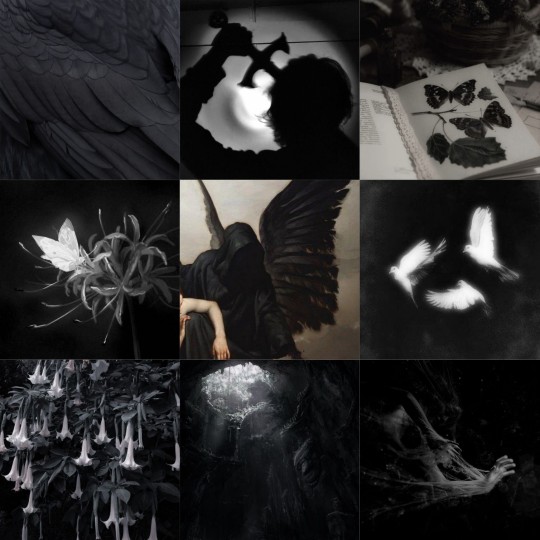
This post covers his family, symbols, notable myths, epithets, orphic hymn, and my favourite passages about him.

PARENTAGE AND SIBLINGS
His parentage and family can be understood through Hesiod’s Theogony (A Greek epic written in the 8th or 7th B.C)
And Nyx (Night) bare hateful Moros (Doom) and black Ker (Violent Death) and Thanatos (Death), and she bare Hypnos (Sleep) and the tribe of Oneiroi (Dreams). And again the goddess murky Nyx, though she lay with none, bare Momos (Blame) and painful Oizys (Misery), and the Hesperides . . . Also she bare the Moirai (Moirae, Fates) and the ruthless avenging Keres (Death-Fates) . . . Also deadly Nyx bare Nemesis (Envy) to afflict mortal men, and after her, Apate (Deceit) and Philotes (Friendship) and hateful Geras (Old Age) and hard-hearted Eris (Strife).
— Parents: Nyx with no father (Roman versions of his birth name Erebus the father)
— Siblings:
Apate (deceit)
Eris (strife)
Geras (old age)
Hesperides (nymphs of the evening)
Hypnos (sleep) Ker (violent death)
Keres (death-fates)
Moirai (fates)
Momos (blame)
Moros (doom)
Nemesis (retribution)
Oizys (misery)
Oneiroi (dreams)
Philotes (friendship)

SYMBOLS AND APPEARANCE
SYMBOLS
— inverted torch → represents a life being extinguished
— butterfly → symbolises the soul
— sword → indicates his authority to sever the thread of life
— poppies → as a symbol of eternal sleep
— wreath → suggesting eternity, or the cyclical nature of life and death
APPEARANCE
Greek vase paintings depicted him as a winged, older man with a beard and rarely as a young, beardless youth.
Roman sculptures portrayed him as a youth holding an inverted torch and a wreath or butterfly

NOTABLE MYTHS
— THANATOS AND THE BODY OF SARPEDON
As seen in the Iliad, Thanatos and Hypnos are tasked to carry the body of Sarpedon away from the battlefield to Lycia so his brothers and countrymen can give him a respectful burial.
Homer, Iliad 16. 453 ff (trans. Lattimore) (Greek epic C8th B.C.) : "[Hera speaks to Zeus about the approaching death of his son Sarpedon :] ‘But after the soul and the years of his life have left him [Sarpedon], then send Thanatos (Death) to carry him away, and Hypnos (Sleep), who is painless, until they come with him to the countryside of broad Lykia (Lycia) where his brothers and countrymen shall give him due burial with tomb and gravestone.’"
Homer, Iliad 16. 681 ff : "Then [Apollon] gave him [Sarpedon] into the charge of swift messengers to carry him, of Hypnos (Sleep) and Thanatos (Death), who are twin brothers, and these two presently laid him down within the rich countryside of broad Lykia (Lycia)."
— THE CAPTURE OF THANATOS BY SISYPHUS
Sisyphus was the (possibly) founder and king of Corinth and was known as ‘the craftiest on men’ in texts by Homer. In the myth, Thanatos was sent to carry Sisyphus into the underworld. Upon Thanatos’ arrival, Sisyphus who was hiding chained him and in doing do, suspended death across the entire world. Thanatos was later freed by Ares who had noticed an absence of death from the battlefield
Alcaeus, Fragment 38a (trans. Campbell, Vol. Greek Lyric I) (Greek lyric C6th B.C.) : "King Sisyphos (Sisyphus), son of Aiolos (Aeolus), wisest of men, supposed that he was master of Thanatos (Death); but despite his cunning he crossed eddying Akheron (Acheron) twice at at fate's command."
Aeschylus, Sisyphus the Runaway (lost play) (Greek tragedy C5th B.C.) : Weir Smyth (L.C.L.) quotes from Pherecydes, a C5th B.C. mythographer, in his discussion of the plot of this lost play: "The drama was satyric; its theme, the escape from Haides of the crafty Korinthian king. According to the fabulous story told by Pherekydes (Frag. 78 in Müller,Fragmenta Historicum Graecorum) Sisyphos made known to Asopos that it was Zeus who had carried off his daughter Aigina; in punishment for which offence the god sent Thanatos (Death) against the babbler; but Sisyphos bound Thanatos (Death) fast, so that men ceased to die, until Ares came to the rescue, released Thanatos, and gave Sisyphos into his power."
— THANATOS WRESTLED BY HERACLES
In the Euripides, a Greek tragedy written in the 5th C B.C. Thanatos is wrestled by Heracles to save the life of Alkestis. Heracles does this to repay Admetos, Alklestis’
Euripides, Alcestis 839 ff : "Herakles : I must save this woman who has died so lately, bring Alkestis back to live in this house and pay Admetos all the kindness that I owe. I must go there [to the funeral at the graveside] and watch for Thanatos (Death) of the black robes (melampeplos), master of dead men (anax nekrôn), and I think I shall find him drinking the blood of slaughtered beasts beside the grave. Then, if I can break suddenly from my hiding place, catch him, and hold him in the circle of these arms, there is no way he will be able to break my hold on his bruised ribs, until he gives the woman up to me. But if I miss my quarry, if he does not come to the clotted offering, I must go down, I must ask Kore (Core, the Maiden) [Persephone] and the Master (Anax) [Haides] in the sunless homes of those below (domos anêlios)."

EPITHETS
Greek
- Paean -> the healing (delivers men from the pains and sorrows of life)
- Melampeplos -> of the black robes
- Anax Nekron -> master of dead men
English (these are ones I've derived from text so partial upg)
- insatiable
- dreadful/dreaded one
- awful god
- with a heart of iron
- without mercy
Latin
- Acherontis - inflicter of Acheron (woe)

ORPHIC HYMN
The Fumigation from Manna. Hear me, O Death [Thanatos], whose empire unconfined, extends to mortal tribes of every kind. On thee, the portion of our time depends, whose absence lengthens life, whose presence ends. Thy sleep perpetual bursts the vivid folds, by which the soul, attracting body holds: Common to all of every sex and age, for nought escapes thy all-destructive rage; Not youth itself thy clemency can gain, vigorous and strong, by thee untimely slain. In thee, the end of nature's works is known, in thee, all judgment is absolved alone: No suppliant arts thy dreadful rage control, no vows revoke the purpose of thy soul; O blessed power regard my ardent prayer, and human life to age abundant spare.

MY FAVOURITE MISC. COLLECTION OF TEXTS
Hesiod, Theogony 758 ff (trans. Evelyn-White) (Greek epic C8th or C7th B.C.) : . . . These are Hypnos (Sleep) and Thanatos (Death), dread divinities. Never upon them does Helios, the shining sun, cast the light of his eye-beams, neither when he goes up the sky nor comes down from it. One of these [Hypnos], across the earth and the wide sea-ridges, goes his way quietly back and forth, and is kind to mortals, but the heart of the other one [Thanatos] is iron, and brazen feelings without pity are inside his breast."
Aeschylus, Fragment 82 Niobe (from Stobaeus, Anthology 4. 51. 1) (trans. Weir Smyth) (Greek tragedy C5th B.C.) : "For, alone of gods, Thanatos (Death) loves not gifts; no, not by sacrifice, nor by libation, canst thou aught avail with him; he hath no altar nor hath he hymn of praise; from him, alone of gods, Peitho (Persuasion) stands aloof."
Aeschylus, Fragment 141 Philoctetes (from Stobaeus, Anthology 4. 52. 32) : "[The wounded Philoktetes (Philoctetes) laments :] ‘O Death (thanatos), the healer (paian), reject me not, but come! For thou alone art the mediciner of ills incurable, and no pain layeth hold on the dead.’"

#solaris writes ɞ#hellenic polytheism#thanatos deity#thanatos worship#helpol#theoi chthonoi ɞ#resources ɞ#lord thanatos ɞ
272 notes
·
View notes
Text
If Deities came to speak with humans face-to-face, most modern polytheists would be wrong.
If called down, Deities would actually be capable of making our lives easier when it comes to working with Them and listening for Their voices. The reason why it’s so hard for people to listen for the Gods is because people don’t necessarily know how important it is to develop their own personal relationship with the Divine.
We are so, so worried about being wrong and we look to other people to tell us which way we go. But there are very few experienced practitioners, even fewer effective teachers (if any at this point) and it is the blind leading the blind.
In all of my years of working with Loki, every single time I had a problem with discernment, it was always due to other people telling me I’m wrong or that their opinion was more important than my intuition. And I believed them because they seemed more knowledgeable. My beliefs I held strongly to in the beginning of my devotion to Him were always bent down by other people thinking they know more than me even though years later, they turned out to be truer than the thoughts I had after I was in a community.
You can call it beginner’s luck, but after years of seeking community, His voice became quieter and quieter. It was when I left pagan groups that I became explicitly aware of what He actually wanted from me. Confirmations started happening, the energy became denser, and things just magically started to work out that never did before and I could hear His voice speak to me in ways I didn’t think were possible prior to this reawakening.
I’m not saying we should be without community, but community resources need to be rewritten to accommodate the fact that us in the West know very little about working with the Gods. We used to. But we have no context for it anymore within society.
We can try to reconstruct a dead culture because you feel like yours is lacking but unless you’re actually receiving direct correspondence with the Divine, you will likely be unlucky in finding Their truest nature.
#deity work#devotional polytheism#mysticism#norse gods#hot take#norse paganism#norse polytheism#lokean#deity worship#paganblr#pagan blog#deity devotion#deity communication#divine communication#loki deity#norse heathen#norse deities#heathenry#devotional mysticism#polytheism#deity witchcraft#beginner pagan#pagan resources#pagan community
181 notes
·
View notes
Text




mini deities: the first age
#flight rising#fr resources#mini deities#earthshaker#flamecaller#windsinger#tidelord#posting more than one image in one post since it saves space
662 notes
·
View notes
Note
Hey, I have some questions regarding deific relationships. I really do love the idea of having a relationship with a god but I’m also terrified? Like, the idea of being watched by a deity kind of horrifies me. Do you not feel like your thoughts are unsafe? Like you never have privacy? What happens if you aren’t a good worshipper? Do you worry about upsetting them at all? Or fear their retribution?
Sorry if any of this is insensitive. I just wanted to understand your perspective.
-☂️
no, it’s completely alright!! :) (i have a tl;dr at the bottom in italics and bold in case this is too much to read, lol)
usually i try not to overthink it, but that’s easier said than done. i believe the gods are watching us, of course, but only in situations where they should be watching. like… no, Lord Apollo isn’t going to be watching me while i’m in the shower (that would be weird), but maybe if im talking about him with friends, he’ll be watching!! or if your deity is trying to see if you make the right choice (ex. if you see someone drop their money, do you try and quickly grab it and steal it before they notice [even if you don’t need the money] or do you return it?)
i also think the gods understand privacy just as much as we want them to. i’m sure they don’t want to watch us every second of our lives. they’ll respect your privacy, dw <33
as for being a good worshipper and worrying about messing up, don’t worry, you’re probably doing just fine. treat your deities well and they will treat you well. they understand that we’re only human, we’re bound to mess up. maybe if you stole something from someone, you’ll lose something (or something like that), but i believe that’s just karma. as long as you aren’t some psychotic killer, they aren’t gonna punish you. i swear.
and i don’t think there’s any specific way to be a “bad worshipper”. i mean, if you’re talking poorly about the gods, ruining their alters, being disrespectful towards them, or anything like that, then i would say you just have room to grow and learn. if you’re doing that all on purpose though… maybe you’re a bad worshipper. but i believe that anyone can learn and grow past their mistakes.
if you want to be better at worshipping the gods or your deity, you can always pray to them, research them, do devotional acts towards them, or even just think about them throughout the day. they only expect you to do your best.
if your best is getting all your missing school assignments done, that’s enough. if you’re best is taking a day off to take care of yourself, that’s enough. even if your best is just waking up, even if you can’t get out of bed, that’s enough. if it’s you’re best, it’s enough. that’s all they want from you. for you to be the best version of yourself that you can be.
(TL;DR: dw, you’ve got privacy. they want you to have privacy just as much as you want to have privacy. and i promise you’re doing great. if you’re even having thoughts about doubting whether you’re a good worshipper or not, you’re a good worshipper, because that means you care. and they won’t punish you. you’re human, they get that. do your best, be your best, and your deities will love you for it <33)
if you want more info from people who know more and are more experienced, i recommend checking these blogs out:
@atheneum-of-you has just recently made their helpol discord server public and they have a huge library of free online books related to hellenic polytheism and the gods. they also make tons of informative posts and updates!!
@hyakinthou-naos is a super cool temple and they just recently have launched their website!! i can’t recommend checking it out enough. it’s so helpful and so beautifully designed
@khaire-traveler has amazing posts about worshipping the gods and a super cool guide to worshipping so many deities discreetly. (i’m pretty sure they’re on hiatus currently)
@screeching-0wl is my favorite resource for info on the gods. their cheat sheets are amazing!! (they’re on hiatus)
these are just my personal recommendations!! (i hope this isn’t too much info and i’m not stressing you out!!) just remember, you don’t have to be perfect. and please, for the love of all things good, do not overwork yourself. i did that and then i had to take a break for most of the year. be better than me please lol
good luck !! <33
#yikes sorry for the info dump#i yap a lot i’m sorry#i like yapping when someone brings up my special interests (one of my special interests is my religion#clearly)#hellenic polythiest#hellenic worship#hellenic community#hellenic deities#helpol#hellenic pagan#hellenic polytheism#hellenic resources
32 notes
·
View notes
Text
PERSEPHONE
A informational post about Persephone:
Persephone is the goddess of spring, and passing of seasons as well as the queen of the Underworld. Kore being the epithet heavily associated with her connection to spring, translating to “the maiden”. Persephone also using many more epithets for diffrent aspects Associated with her. Persephone is the daughter of Demeter and Zeus. Persephone Deione- “Daughter of Demeter”. Being one of her many epithets.
"He [Zeus] came to the bed of all-nourishing Demeter, and she bare white-armed Persephone whom Aidoneus [Haides] carried off from her mother; but wise Zeus gave her to him.” (theoi.com- PARENTAGE OF PERSEPHONE)
stuff Associated with Persephone:
Pomegranate
Bats
Deer
Spring
Underworld
Flowers
Skulls
Garnet, gems, coins (stuff Associated with hades)
Cerberus
Dogs
The Eleusinian Mysteries:
i feel like this link sums up the mysteries pretty well.
https://web.archive.org/web/20030920115808/http://www.uwec.edu/Philrel/faculty/beach/publications/eleusis.html
“The Homeric Hymn narrates the founding story for the Mysteries as well. Demeter, disguised as a human, arrives at Eleusis while searching for her daughter, and the city takes her in as a nurse. She feels obliged to reward the city for its hospitality and reveals herself. Then she shares her secret rites, which consequently become the central theme of the Eleusinian Mysteries. But initiation to these rites was no simple task. Participants had to prepare for at least half of the year or more and nurture themselves spiritually to embrace the secret revelation.” (Eleusinian Mysteries: The Secret Rites No One Dared Talk About" TheCollector.com)
Proerosia:
(Demeter related but can Also involve Persephone)
“The Proerosia, is about the things to be done “before plowing”. The first fruits festival was in May, when the “first fruits of the cereals” were harvested. According to H. W. Parke (74), the offerings to Demeter were made to invoke her blessing on the plowing and seeding to come.” (proerosia- hellenion.org)
Hymn to persephone:
Orphic Hymn 29 to Persephone (trans. Taylor) (Greek hymns C3rd B.C. to 2nd A.D.) :
"Hymn to Phersephone. Daughter of Zeus, Persephone divine, come, blessed queen, and to these rites incline: only-befotten, Plouton's [Haides'] honoured wife, O venerable Goddess, source of life: 'tis thine in earth's profundities to dwell, fast by the wide and dismal gates of hell. Zeus' holy offspring, of a beauteous mien, Praxidike (Avenging-Goddess), subterranean queen. The Eumenides' [Erinyes'] source, fair-haired, whose frame proceeds from Zeus' ineffable and secret seeds. Mother of Eubouleos [Dionysos-Zagreos], sonorous, divine, and many-formed, the parent of the vine. Associate of the Horai (Seasons), essence bright, all-ruling virgin, bearing heavenly light. With fruits abounding, of a bounteous mind, horned, and alone desired by those of mortal kind. O vernal queen, whom grassy plains delight, sweet to the smell, and pleasing to the sight : whose holy form in budding fruits we view, earth's vigorous offspring of a various hue : espoused in autumn, life and death alone to wretched mortals from thy power is known : for thine the task , according to thy will, life to produce, and all that lives to kill. Hear, blessed Goddess, send a rich increase of various fruits from earth, with lovely peace : send health with gentle hand, and crown my life with blest abundance, free from noisy strife; last in extreme old age the prey of death, dismiss me willing to the realms beneath, to thy fair palace and the blissful plains where happy spirits dwell, and Plouton [Haides] reigns.”
Here are some of Persephone's epithets:
Azesia- “of the Dried Fruits” and/or “Who Seeks”. The epithet is shared with Demeter
Brimo- “the Angry” or “the Terrifying”..
Carpophorus- “Bringer of Fruit”. This epithet was specific to Persephone in the role of Kore.
Chthonia- “of the Earth” (used by several chthonic deitys)
Deione- “Daughter of Demeter”.
Despoena- “The Ruling Goddess” or “The Mistress.”
Eleusina- “of Eleusis”. This epithet is shared by Persephone and Demeter.
Epaine- “the Fearful”. (More like feared by her worshipers)
Hagne- “Pure” or “Holy One”
Kore- “The Maiden”. Usually used when referring to persephone before she became queen of the Underworld. I use it in reference to her spring aspects
Leptynis- refers to wealth with her role as queen of the Underworld and being a chthonic deity
Megala Thea- “Great Goddess”.
Praxidike- “Bringer of Justice”.
Sources:
theoi.com- PARENTAGE OF PERSEPHONE
Hesiod, Theogony 912 ff (trans. Evelyn-White) (Greek epic C8th or C7th B.C.)
theoi.com- Titles of Demeter & Kore: Ancient Greek Religion
The Eleusinian Mysteries, Edward A. Beach
Homer, The Iliad - Greek Epic C8th B.C.
The Homeric Hymns - Greek Epic C8th-4th B.C.
Orphic Hymn 29 to Persephone (trans. Taylor) (Greek hymns C3rd B.C. to 2nd A.D.)
Tareen, Zeynep. "Eleusinian Mysteries: The Secret Rites No One Dared Talk About" TheCollector.com, February 18, 2022, https://www.thecollector.com/the-eleusinian-mysteries-ancient-greece/.
https://www.tumblr.com/diana-thyme/737747722995712000/greek-gods-101-persephone?source=share
https://www.hellenion.org/festivals/proerosia/
#hellenic polytheism#hellenic pagan#hellenic gods#persephone#hellenic polytheist#persephone deity#epithets#homeric hymns#orphic hymn#informational#resources#hymn to persephone#demeter deity#demeter#lady persephone#lady demeter#zeus#zeus deity#lord zeus#Proerosia#The Eleusinian Mysteries#the mysteries#cult of Persephone#cult of Demeter#persephone devotee
23 notes
·
View notes
Text
Mythic Literalism in Hellenism
Mythic literalism in Hellenism is the belief that Greek myths and legends should be interpreted as literal historical facts.
What is Mythic Literalism?
Mythic literalism is the belief that the stories and myths of the ancient Greek pantheon are to be taken as historically and literally true accounts. Practitioners of mythic literalism view the gods, heroes, and events described in Greek mythology as real, factual occurrences rather than symbolic, allegorical, or metaphorical narratives.
The Role of Myth in Hellenism
In traditional Hellenism, the myths and stories of the Greek gods are not necessarily seen as literal, historical truth. Rather, they are understood to convey deeper spiritual, philosophical, and moral truths through the use of symbolism, metaphor, and archetypal imagery. The mythic narratives are viewed as sacred texts that encode important lessons about the nature of the divine, the cosmos, and the human condition.
The Mythic Literalist Perspective
Mythic literalists, on the other hand, approach these myths with a more fundamentalist interpretation. They insist that figures like Zeus, Hera, Athena, and Heracles were real, physical beings that walked the earth and directly intervened in human affairs. Events described in the myths, such as the Trojan War or the labors of Heracles, are believed to have occurred as narrated in the ancient texts.
Implications of Mythic Literalism
This literal interpretation of Greek mythology has several implications for the mythic literalist's worldview and religious practice:
Cosmology: Mythic literalists tend to perceive the Greek cosmos, with its pantheon of gods, titans, and other divine entities, as an objective, empirical reality rather than a symbolic representation.
Theology: Mythic literalists often have a more anthropomorphic and personified view of the gods, seeing them as distinct, autonomous individuals with distinct personalities, powers, and spheres of influence.
Spiritual Practice: Mythic literalists may engage in rituals, offerings, and devotions aimed at directly communicating with or appeasing the gods, rather than using these practices as a means of cultivating inner spiritual growth and harmony.
It's important to note that mythic literalism is just one approach within the broader Hellenic tradition. Many Hellenists find value in studying the myths while maintaining a more symbolic or allegorical interpretation. The diversity of perspectives is part of the richness and complexity of modern Hellenism.
#hellenic deities#hellenic polythiest#deity#devotees#deity worship#greek deities#greek mythology#devotional#informative#helpful#resource#useful#information#if i said anything inaccurate please let me know.#hellenism#hellenic polytheism#hellenic worship
40 notes
·
View notes
Text
In my humble experience, when consorting with the world of gods and spirits, I see two main possible ways to reap the benefits. They are both easy to do, and anyone can do it regardless of skill level. (Doing it well, of course, comes with experience and practice - this applies to anything.)
1. The Path of Sorcery. This is about pacts and contracts. Very much like a business transaction. Two parties agree on an exchange, both provide the resources they have, and if all goes well, both benefit when the contract is fulfilled. This is very much an A + B = C situation, the process is clear and the outcome and parameters of success are well defined. Results can come very quickly. As long as the method is sound, the chances of success are high, and there is no compatibility needed. But there is no loyalty nor further investment. You’ll get what you paid for; your fate is in your own hands and there is no safety net except the one you made yourself. If these transactions are done skillfully, many avenues can open up for the sorcerer.
2. The Path of Devotion. This is a relationship, it is about giving without the expectation of receiving. It requires faith, courtesy and good will, as well as compatibility. Either side will initiate interactions at their own pace, and it takes much longer to see results. Further commitments are made over time; the stakes are higher, but so are the rewards. Once the relationship is built up, getting what you desire can be as easy as asking, although the spirits will expect you to receive their input on the choices you make. You may have to take oaths for the relationship to progress any further, and adopt certain moral obligations. If these are properly honoured, one’s problems can even seem to disappear of their own accord, as one’s spiritual allies become invested in them and take their own initiative to secure better opportunities for the devotee. This path can open up other paths through one’s spiritual network, but it can also close off potential relationships with certain spirits depending on your allegiances.
These are both very valid paths to power. The sorcerer is not necessarily better than the devotee, and vice versa – one can be an exceptional sorcerer and scarcely touch a devotee adored by their spirits. It all depends on how skillfully one handles the path they are on. Naturally, the best practice will combine a bit of both, so that one is receiving benefits from a variety of spirits and builds a well-rounded skill set. And as one progresses on their path, the lines between sorcery and devotion will become increasingly blurred.
357 notes
·
View notes
Text
I'm not colouring them✨
Character References:
Mario:

Luigi:

Bob:
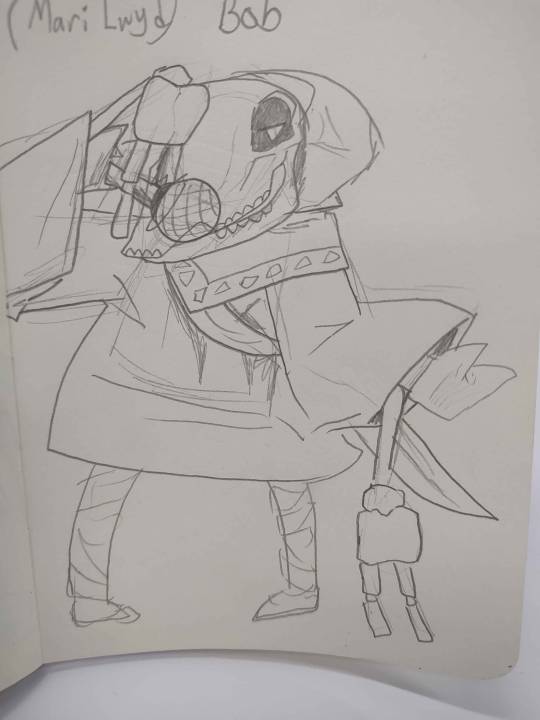
It's not that I dont like them any less than the others
It's that I already have a lot of the characters coloured, I wanna be done doing references after Meggy, Tari, 3 and Shroomy are done
Maybe I'll come back and colour them some day but literally every time I look at them, I back up and colour someone else instead. My mind dreads colouring them for whatever reason so im just not going to ✌️
Mario:
Isn't a true blooded Elf, he was born outside of the Elf community and adopted alongside Luigi. SMG4s' influence caused the man to grow up Memey and Goofy bc 4 was basically their 3rd brother
Knows how much Four wants to make an impact but unfortunately doesn't really know how to properly help the guy other than doing this one favour.... That he constantly messes up bc he lacks some brain cells up there
Was gifted Elf Powers, and eventually because of how funny Mario was to Four. When Four became the next Santa he bestowed THE FUNNY powers onto Mario just to watch him do wacky shit
Mario is like if a dog took human shape- hes always hungry, loves you a bunch if youre in his friend group, not the smartest but tries his best, will destroy anyone who touches his family, and is a certified silly lil guy
All things considered, he's pretty lazy. He has no interest in making toys so instead does Meme Reviews of what Four makes for his youtube channel. Afterall if Mario doesn't laugh that definitely means it's not funny!
Luigi:
While Four was like a 3rd brother to the twins, Luigi didn't really get into the memes as much as Mario. Instead he liked following around Fours mother in order to watch her do motherly things. Finding them interesting
Awesome cook and loves to stay in the kitchen making home meals for as many elves as possible by hand alone, before needing to rely on his magic to do the rest
Bit of a scardy cat but brave when you need him to be
Sense Mario has 1 braincell on Christmas Eve, Luigi volunteered himself to travel with his brother around the world in order to make sure Christmas isnt ruined by wrong deliveries or Mario isnt arrested by Hal for speeding (yes they need to remind him every year that theyre allowed to go this fast)
Bob:
Mari Lwyd - Idea given to me by @liliththequeenofdemon
Mari Lwyd goes from door to door engaging in a song with the owners of the house, and if the owners yield they have to invite the horse inside. Give it food and drink.
So she proposed to me that Bob goes door to door rap battling people for alcohol and it was honestly perfect
Hes just like Bob in the cannon SMG4 universe. I don't wanna change him much bc that was the purpose of involving him in the first place. Hes fine how he is lol
#smg4 au#holiday deity au#mario and luigi#bob smg4#smg4 bob#traditional art#character reference#sorry chat i just dont have the motive to colour these ones#in good news that means ill be done sooner#you dont get to see holidag resources or the mystery charactee until they show up#elves#elf#santas elves#mari lwyd#rap battle#of all time
13 notes
·
View notes
Text
2/18/24
Feeling like I wanna work with the folk devil and/or Satan. Anyone got any good resources or recommendations?
#death witch#witchblr#death witchcraft#folk practitioner#queer witch#folk magic#folk practice#folk witchcraft#pagan#witchcraft#folk spellcraft#united states folklore#american folklore#folk devil#satanism#satan#satanic#resources#deity work#deity worship
55 notes
·
View notes
Text
For anyone who wants some resources on the gods.Here is my google drive folder with every resource that I've found so far.Feel free to ask me if you want a certain article or a book,I will gladly help you. ^^
39 notes
·
View notes
Text
Heqat Rebirth Heka
Heqat is often viewed as a frog headed goddess who presides over birth (as well as rebirth). She sits with Khnum at His potters wheel, and breathes life into His creation. She is also present at birth, and acts as a midwife to the Netjeru.
In terms of rebirth and recreation, She is often tied to the resurrection of Wesir and the dead. She is there for us in death, just as She is at birth.
This heka focuses on the rebirth and recreation aspect, to have Her assistance in facilitating change and growth within our lives. When approaching Her to do this heka, I would recommend having a clear idea of what rebirth and change means to you, and how you wish for it to come in your life (whether it is in terms of personal, professional, or other matters).
As with all heka, I recommend cleansing yourself beforehand. Speak the words aloud, and allow your magic and strength to be behind each word.

The magician approaches their shrine with offerings and a glass of cool water. They call upon Heqat, and present the offerings while speaking aloud.
Words to be said:
"O' Heqat, Mistress of Creation, You who were present at my birth, I come to Thee as Thy beloved child!
O' Heqat, Great Mother, You who are constant in my life, I come to Thee for Thy assistance!
I have brought [name of offerings], May they please You, May they nourish You, May You hear my prayers now!"
The magician then focuses on rebirth and recreation. They pray to Heqat, touching on what they need assistance with, while praising and thanking Her for Her help in such matters.
They then take the glass of water, and hold it above or within the shrine.
Words to be said:
"From the waters of the Nun, creation was born. From the waters of the Nun, all is created. I too was created and born within the Nun, at the hand of Heqat.
She has brought me forth, born anew! She has brought me forth, in strength and prosperity! She leads me now, to my future! She leads me now, to my desires!"
The magician may now 'revert', or drink the water. The offerings may sit upon the shrine if nonperishable, or 'reverted' as well if a perishable food item.
#coyote resources#heka#kemetic#kemetic magic#kemetic witchcraft#spell#spells#spellcraft#witchcraft#heqat#heqet#heqat deity
19 notes
·
View notes
Text
Understanding the Silence: Why Deities May Not Respond
There are times wherein we cannot hear the voices of the Gods. Perhaps you know how to listen, perhaps you have built the shrine, and yet, nothing seems to be working. Perhaps you have found yourself in the midst of a struggling time and the last thing you want to do is listen for an inner voice.
I have spoken about deity communication and what that can look like but I’ve yet to speak on what happens when you are unable to hear the voices of the Gods.
There are many reasons why this could be happening and not all of them I am going to cover in this post. I’ve already touched on dissociation and feelings of moral failure but in this post I will speak on why Gods may not always respond.
It is important to note that just because you want to reach a Deity, it does not mean that They will reach back. Just because you give an offering, built a shrine and have prayed to Them does not mean They are going to give you the time of day. This doesn’t always mean that They don’t like you, nor does it have anything to do with who you are as a person, either.
Read the rest of this post here:
#devotional polytheism#deity work#paganblr#mysticism#deity worship#norse paganism#norse polytheism#pagan blog#pagan resources#beginner pagan#beginner witch#advanced pagan#greek polytheism#celtic polytheism#deity devotion#deity communication#devotional mysticism#mystic#deity relationships#norse deities#norse gods#discernment#divine communication#deity witchcraft#witchblr#polytheism#paganism#witchcraft#pagans of tumblr
84 notes
·
View notes
Text
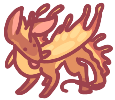



mini deities: the second age
280 notes
·
View notes
Text
Namma/Nammu
𒀭𒇉
Sumerian Goddess, primarily from the city of Eridu
Mother of the Gods. Creator of Mankind, specifically in Eridu, elsewhere this role went to Nintur or Ninmah
—How to use internet archive link
🔵 Information
From Gods Demons & Symbols by Black [Internet Archive Link]
"Nammu was a goddess who was considered, in some traditions, to have given birth to An (heaven) and Ki (earth) and to many more of the more ancient gods. Especially she was regarded as the mother of Enki. She came to be thought of as one of the mother goddesses. Her name is written with the same sign as engur, a synonym of abzu, and it is probable that she was originally a personification of the subterranean ocean." [p134]
Dictionary of Ancient Near Eastern Mythology by Leick [Internet Archive Link]
Her name is usually written with the sign engur which was also used to write Apsu. In ancient times she personified the Apsu as the source of water and hence fertility in lower Mesopotamia. She may well have been worshipped in Eridu before Enki, who took over most of her prerogatives and functions. Significantly he was called the son of Nammu. In spite of her decline following the superiority of Enki, during the Neo-Sumerian period, at least at Ur, she was still considered important enough to have statues commissioned in her honour and she also features in the name of the famous king Ur-nammu. In mythology, Nammu appears as the primeval Mother-goddess in Enki and Ninmah who 'has given birth to the great gods'. She has the idea of creating mankind as a help for the gods and it is she who goes to wake her son Enki, asleep in the Apsu, that he may set the process going. [p 124]
Handbook of Gods & Goddess of the Ancient Near East [Google Books Link]:
"Namma: Sumerian goddess of the primeval, subterranean ocean. In the lexical series Diri the name has a syllabic rendering na-am-ma. In some traditions she was the mother of the sky god An, the earth goddess Ki, and a number of other deities. Enki/ Ea, the god of freshwater and wisdom, was considered her son. In the myth of "Enki and Nin-mah," when the other deities began complaining about how hard they had to work, it was Namma who awakened Enki from his sleep to urge him to create more creatures to take on the work of the gods. However, he delegated the task to Namma, who then received the credit for creating human beings. There was a shrine to the goddess in Marduk's great temple at Babylon, and at least one other of her sanctuaries is known"[p222]
Excerpt from Oracc [Link]:
"Very little is known about Namma, who belongs to the oldest generation of Mesopotamian deities and is associated with the pantheon of Eridu. She is mainly known for her role in the cosmogony of early Mesopotamia and her importance in magic, which is restricted to texts written in Sumerian [...]. According to the god list An-Anum, tablet I line 28 [...], Namma bears the title "mother who gave birth to the heavens and the earth. Because this goddess's name is written with sign for "(cosmic) subterranean waters" (Sumerian: engur) Wiggermann [..] has called her the "Cosmic Ocean. [...] In the Sumerian poem of Enki and Ninmah (ETCSL 1.1.2, line 17 link) Namma is called the "original mother who gave birth to the gods of the universe", again according her primary status among all the gods and describing her role in Mesopotamian cosmogony"
Section from Enki & Ninmah (ETCSL 1.1.2) [Link]
*Bolded part that explains her mother of Gods role, and also her creating man (different deities depending on myth)
*How deity, people, and place names are spelled is wildly inaccurate in the ETCSL, they don't even follow their own rules. But I still did not change the quote
"The gods said, weeping: "He is the cause of the lamenting!" Namma, the primeval mother who gave birth to the senior gods, took the tears of the gods to the one who lay sleeping, to the one who did not wake up from his bed, to her son: "Are you really lying there asleep, and ...... not awake? The gods, your creatures, are smashing their ....... My son, wake up from your bed! Please apply the skill deriving from your wisdom and create a substitute for the gods so that they can be freed from their toil!" At the word of his mother Namma, Enki rose up from his bed. In Hal-an-kug, his room for pondering, he slapped his thigh in annoyance. The wise and intelligent one, the prudent, ...... of skills, the fashioner of the design of everything brought to life birth-goddesses. Enki reached out his arm over them and turned his attention to them. And after Enki, the fashioner of designs by himself, had pondered the matter, he said to his mother Namma: "My mother, the creature you planned will really come into existence. Impose on him the work of carrying baskets. You should knead clay from the top of the abzu; the birth-goddesses will nip off the clay and you shall bring the form into existence. Let Ninmah act as your assistant; and let Ninimma, Cu-zi-ana, Ninmada, Ninbarag, Ninmug, ...... and Ninguna stand by as you give birth. My mother, after you have decreed his fate, let Ninmah impose on him the work of carrying baskets."
The Harps That Once by Jacobsen [Google Books Link]
"Namma, Enki's mother, was probably seen as the power in the riverbed which, empty or nearly empty in summer, gives birth to the fresh waters, to Enki, in the spring flood. This interpretation gains a measure of support from the fact that the cuneiform sign with which her name was written served also, if supplemented with the sign for "water," to write the word for "river." Etymologically the name Namma goes back to Nin-imma (nin-immaran-amma nama›namma) "lady female genitals," a personification of the numinous power to shape, mature, and give birth to the child, and it is as birth goddess generally, rather than as goddess of the riverbed, that the text here characterizes her. That latter aspect she may conceivably have acquired because the mythopoeic imagination conceived of the great gash in the earth which the dry riverbed presents as the genitals of Mother Earth herself, and the prototype of all female parts everywhere. Namma's role as birth goddess generally and as the one who gave birth to man probably represents a local tradition, perhaps at home in Eridu. Elsewhere it is the goddess Nintur, or Ninmah as she is called in this composition," [p 158]
From Wiggermann "Nammu" [PDF Link]
*He disagrees with Jacobsen on Nin-imma, but Wiggmann addresses many other authors both agreeing and disagreeing but its too densely written for me to even remotely understand the back & forth between the Assyriologists.
"Nammu is an ancient goddess of Eridu, who plays a part in the local (and early national) mythology as creatrix/mother goddess and as supporter of Enki in Magic. Most references relate to either of these two roles [...] Only her epithet "(^munus)agrig-zi-é-kur-(ra-)ke", "true housekeeper of Ekur" points outside Eridu to the pantheon of Nippur, but it may be due to a confusion with Nin-imma, Enlil's scholar and scribe." [p 137 Column 2]
🔵 Titles / Epithets
*I did not use š, ḫ, or ĝ when typing these for ease of reading. See Sisterofiris' posts on transliterations [link] & normalizations [link]. Page numbers correspond to Wiggermann's Nammu PDF, linked above.
🔹Amaùtuanki — "Mother who gave birth to Heaven and Earth" (p137 column 2)
🔹Ama-palil-ù-tu-dingir-shár-shárra-ke-ne — "Mother, who gave birth to all the gods" [I kept dashes so it can be read] (p138 column 1)
🔹Amarhusheke — "Compassionate Mother" (p138 column 2)
🔹Amagal — "Great Mother" (p138 column 2)
🔹Agrigziékurrake — "True housekeeper of Ekur" (p137 column 2)
🔹Amadingirdingira | Modern— [Link]
"Mother of (the) Gods" in Sumerian
𒂼 — Mother, ama [Link]
𒀭𒀭— Many Gods, dingirdingir [Link]
𒀝 - "of" genetive case suffix, .a(k) [Link]
🔵 Iconography
She has no known iconography that has been found yet according to Oracc.
I made these tonight on my phone. Left has an ocean as its background to represent the "Cosmic Sea" aspect.
Its the Mesopotamian horned cap/crown of divinity then her name 𒀭 (diĝir) and 𒇉 (engur)
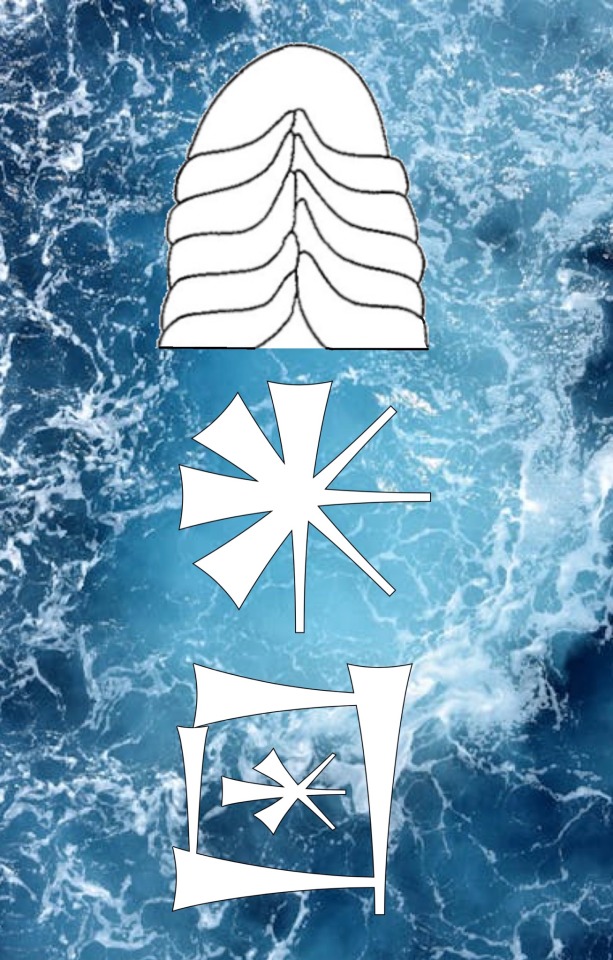
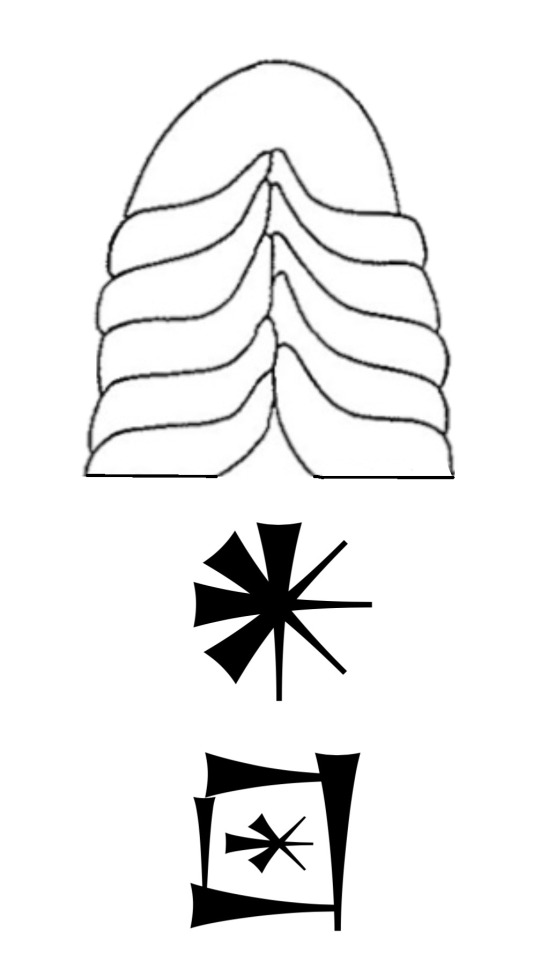
(click on right its not cut off as mobile shows)
#polytheism#paganism#nammu#namma#annunaki#sumerian#sumer#mesopotamia#mesopotamian#eridu#deity#deities#god#goddess#divine#mother goddess#primordial sea#levpag#cuneiform#cuneiform journey#deity resource#landof2rivers
25 notes
·
View notes
Note
Hello do you happen to know where I can find resources on Hades?
I have in my collection Daniel Ogden’s Greek and Roman Necromancy and Robert Temple’s Netherworld but I find there is still so little about him. I know there isn’t much to begin with but maybe you know some other you can share? Thank you! Love your page
Thank you so much! A lot of my resources are online, as in online books, translations, articles, academic essays, etc., so be warned. Some good resources (some are things I recommend, some are things others recommend) include:
Underworld Gods in Ancient Greek Religion (Mackin Roberts, 2020; Article)
Worshipping Hades Myth and Cult in Elis and Triphylia (Burton, 2018; Article)
Theoi.com’s Article on Hades
Arthur Fairbanks’ “The Chthonic Gods of Greek Religion”
Daniel Stoll’s “Searching for Hades in Archaic Greek Literature”
Jamie Waggoner’s “Hades: Myth, Magic, & Modern Devotion”
Unfortunately, I can’t recommend (nor find, really) any more resources about Hades. He’s criminally under-researched, in my opinion. I hope this helps, though!
#hades#hades god#hades deity#resources#hades resources#deities#hellenism#helpol#hellenic#hellenic pagan#hellenic polytheism#hellenic community#hellenic polytheist#hellenic deities#Hellenic resources#hellenism resources
60 notes
·
View notes